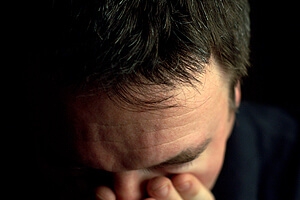Reading Time: 5 minutes
When it comes to drugs and alcohol abuse, the initial desire to consume the substances is often one to find relief from sadness or worry, to celebrate, experiment, or to relax. The repeat desires are lot less controllable as you move on toward dependency and addiction where it takes more of the substance to achieve the desired effect and quitting use becomes difficult.
For those who are able to overcome addiction and dependency, relapses are common and in fact, occur in up to 90% of some drug abuser populations such as those using heroin or opioid prescription painkillers. Like other chronic diseases, including diabetes or high blood pressure, substance addictions can be treated and managed with vigilance, commitment, and the proper tools.
Relapse does not necessarily mean a failure of one’s recovery, but it is best avoided if possible. If you recognize these signs of relapse seek help ASAP.
1. Slipping Back Into Old Habits

Isolation, distress, and persistent cravings are potential signs of relapse.
Ambivalence to change associates, daily activities, or environments often accompanies the person as they seek treatment for substance abuse, but, avoiding “triggers” or cues that remind you of using or places undue amounts of stress in your life are crucial factors that influence cravings and promote substance abuse behaviors. You may think that you can handle the situations through sheer determination, but, letting down your guard and slipping back into old habits is recipe for relapse.
2. Delusional Thinking
Delusional thinking is a common warning sign of relapse when you become complacent in remembering the consequences of your substance abuse and the power that substance had over you before. According to the Center for Studies in Behavioral Neurobiology, “Even when drugs are unavailable for long periods or when users are successful in curbing their drug use for extended periods, individuals remain vulnerable to events that precipitate relapse.”
3. Too Much Time on Your Hands
Our minds are capable of processing thousands of thoughts per minute we may not be aware of. Drug activities can also become hard-wired in your brain and the more time you have on your hands, the easier it is to allow the reminders of past drug experiences, effects, and cravings to creep in. According to the NIDA,” Addiction changes the brain in fundamental ways, disturbing a person’s normal hierarchy of needs and desires and substituting new priorities connected with procuring and using the drug. The resulting compulsive behaviors that weaken the ability to control impulses, despite the negative consequences, are similar to hallmarks of other mental illnesses.”
4. You Think Just One More Time Won’t Hurt
Denying your vulnerability and thinking just a small amount or using just one more time won’t hurt is a warning sign of relapse that can occur long before you physically take action to resume use. Don’t go there! Underlying the addiction process, is the similar reinforcement of certain behaviors our brains deem to be salient or important for survival such as eating, drinking, and sex. The more rewarding the drug effects were, the more likely priming yourself again will return you to the full-blown consequences of addiction.
5. Internal Feelings of Discontent
Internal feelings of discontent are not always bad as long as they motivate you toward achieving positive and healthy goals, but, letting them take over your emotions, thoughts, and behaviors in a negative way is a sure sign of impending relapse. Moodiness, anger, frustration, anxiety, and depression are significant signs that more healing needs to occur can easily point you in the directions of relapse or the abuse of other substances to be able to “get a grip on things.”
6. Isolation
Isolation is a warning sign of relapse that often leads to depression increasing the relapse risks. Combined with having too much time alone and lack of encouragement from a positive support system, this is a dangerous path to be on. According to SAMHSA, “In 2012, adults aged 18 or older who used illicit drugs in the past year had higher rates of serious thoughts, plans, and attempts of suicide compared with all adults in the general population (i.e., including users and nonusers of illicit drugs in the past year).
7. You Romanticize Your Days of Substance Abuse
It’s difficult to undergo the changes you need to make in order to remain abstinent and there may come a time when you think the treatment was ineffective or that life seemed easier when you had a substance to rely on. Although you know that there’s still work that needs to be done, a common warning sign of relapse is romanticizing those days of substance abuse and selectively disregarding the consequences of it.
8. Overreacting to Cravings
Overreacting to cravings can often lead to self sabotage. If you think that treatment and your recovery efforts are not working, you may say to yourself, “Why bother?” Not only is this a self-destructive attitude, but, the dangers of a full blown relapse will be more likely to maximize your low self-esteem increasing your abuse potentials while reducing your motivations to seek help again.
9. Disregarding Health Issues
Disregarding hygiene, physical, emotional, or mental health are common warnings signs of relapse that reflect a sense of disassociation from things that can really harm you. Recovery involves improving your health and not tearing it down. The more you let slide, the less able you will be to ward off the temptations of relapse when they occur.
10. Stop Taking Recovery Steps
Whether you stop going to 12-Step meetings, drop out of treatment prematurely, or shut out your family and friends who encourage your recovery, you are setting yourself up for a relapse. You need a positive support system to help sustain you and give you feedback and guidance in situations when you have no hope of your own.
